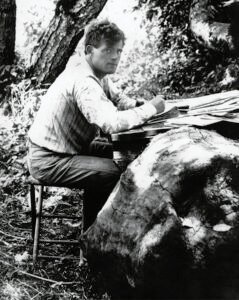Jack London
 Jack London (1876 – 1916) is best known for his books The Call of the Wild, White Fang, and The Sea-Wolf, and a few short stories, such as “To Build a Fire” and “The White Silence.” In fact, he was a prolific writer whose fiction explored several regions and their cultures: the Yukon, California, Hawaii, and the Solomon Islands. He experimented with many literary forms, from conventional love stories and dystopias to science fantasy. His noted journalism included war correspondence, boxing stories, and the life of Molokai lepers.
Jack London (1876 – 1916) is best known for his books The Call of the Wild, White Fang, and The Sea-Wolf, and a few short stories, such as “To Build a Fire” and “The White Silence.” In fact, he was a prolific writer whose fiction explored several regions and their cultures: the Yukon, California, Hawaii, and the Solomon Islands. He experimented with many literary forms, from conventional love stories and dystopias to science fantasy. His noted journalism included war correspondence, boxing stories, and the life of Molokai lepers.
Despite his prolific output, until recently and specifically the publication of this book, few had realized that Jack spent an intense period in 1898/1899 studying classical poetry and actually wrote a considerable amount of poetry. In fact, his intention was to be a poet but switched to fiction as a means of earning an income, and infused many of his books with poetry. From his letters, it is clear that he fully intended to return to poetry at some stage.
A committed socialist, he was among the most influential figures of his day, who understood how to create a public persona and use the media to market his self-created image of poor-boy-turned-success. He left over fifty books of novels, stories, journalism, poetry and essays, many of which have been translated and continue to be read around the world.
